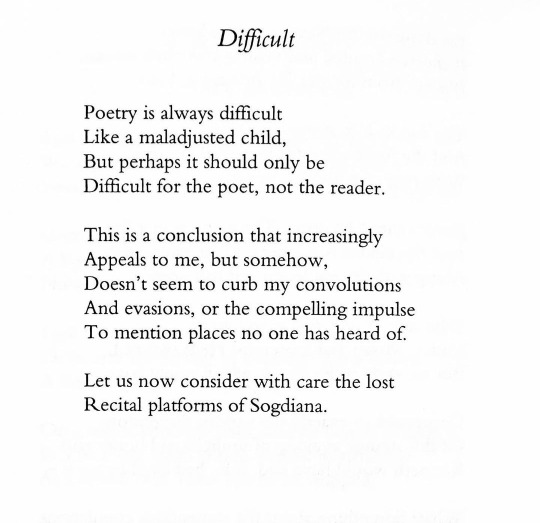#sogdiana
Text
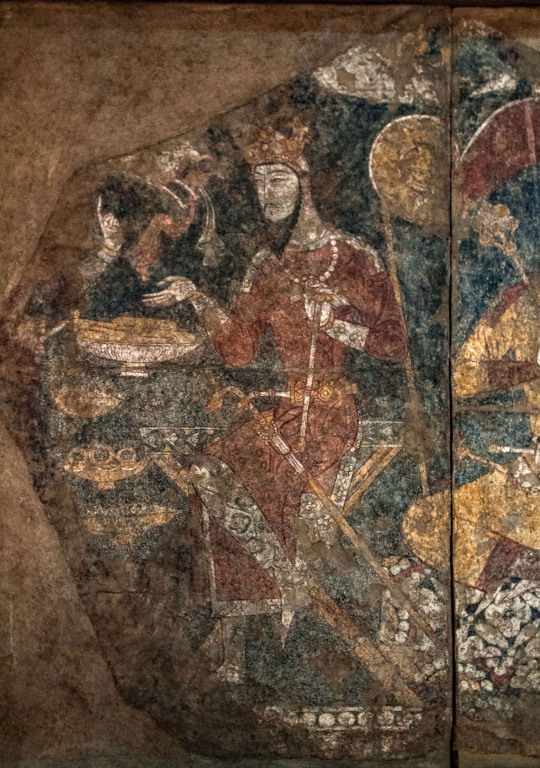
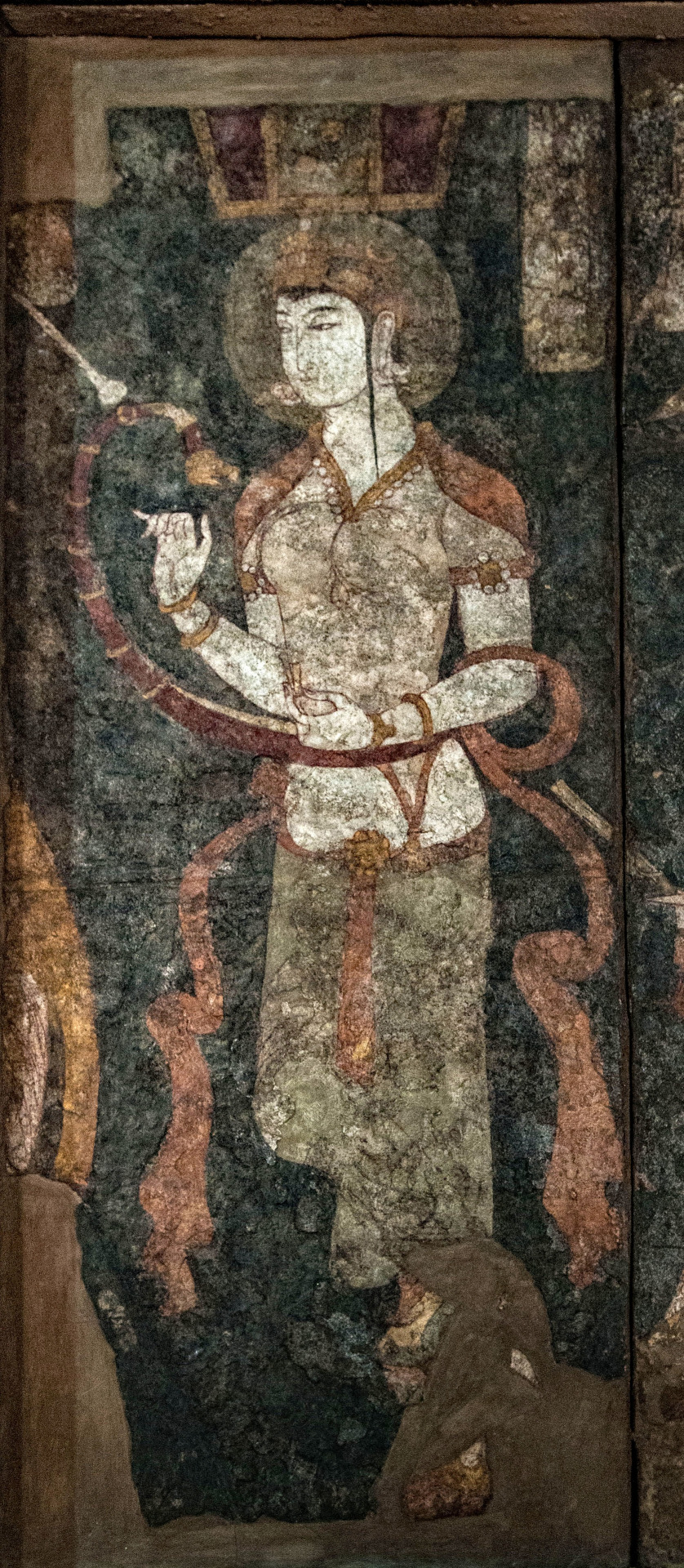
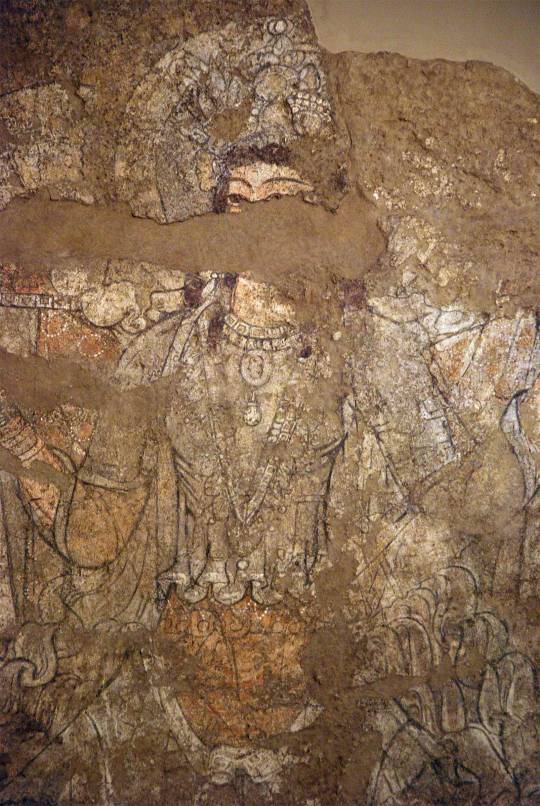



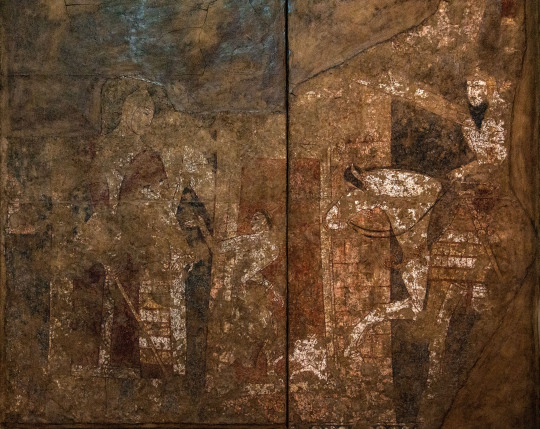

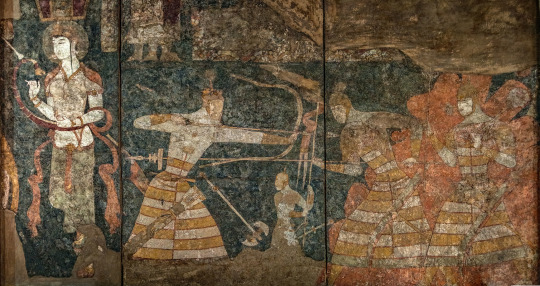



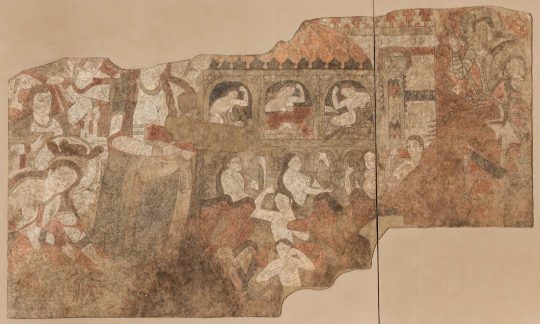


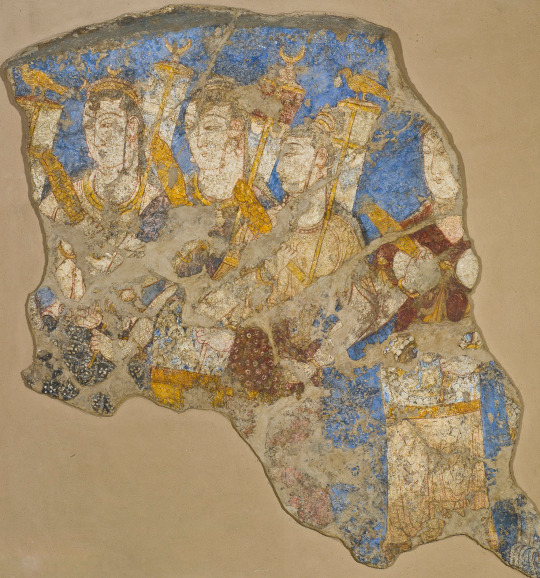


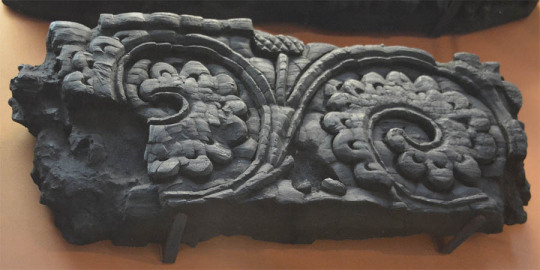
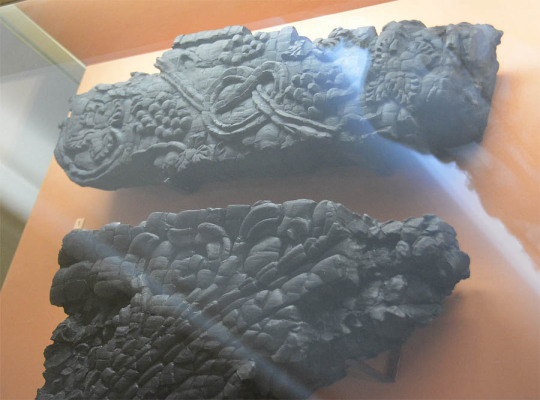

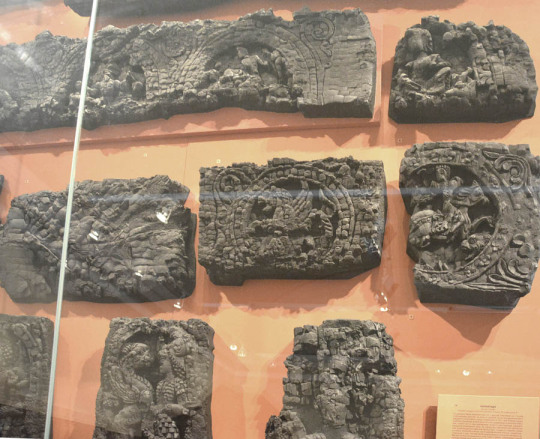

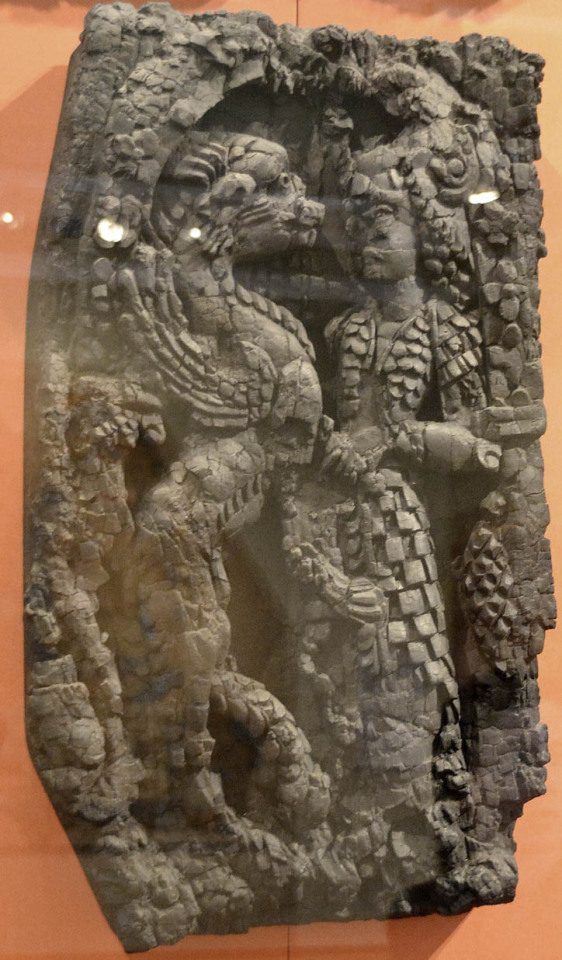
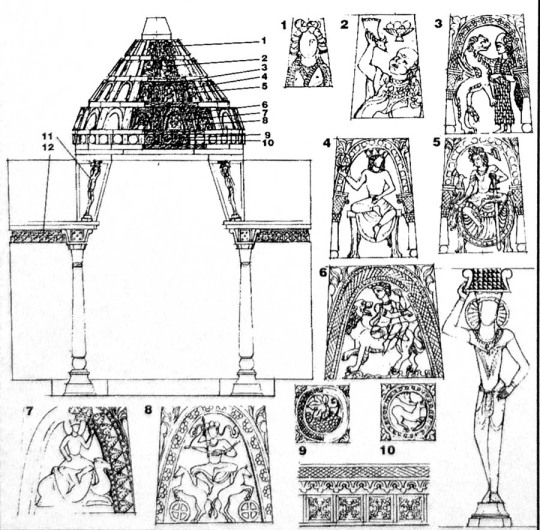
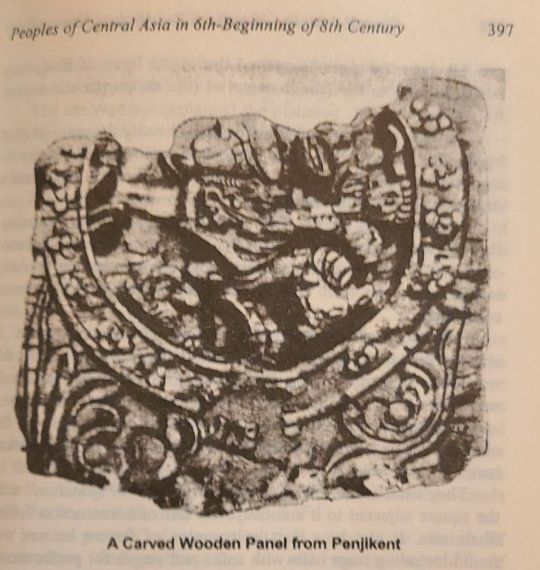
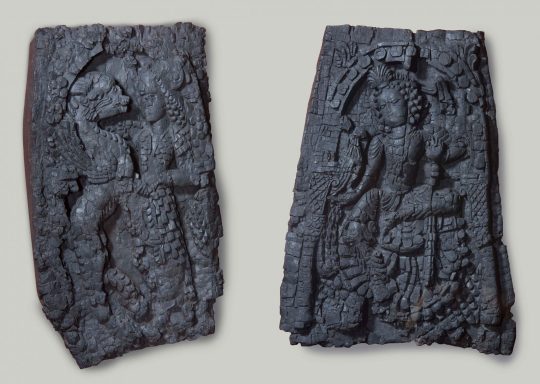
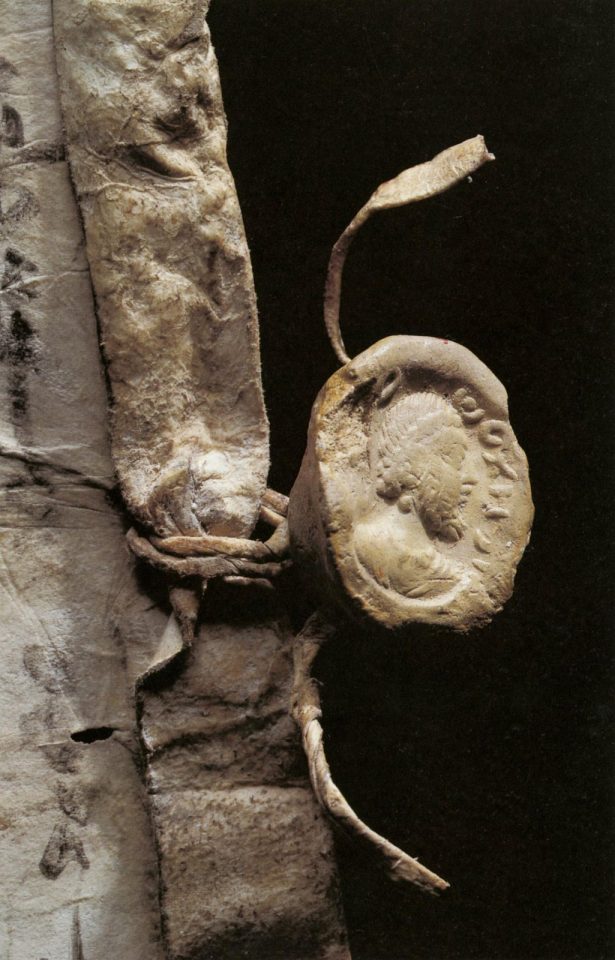
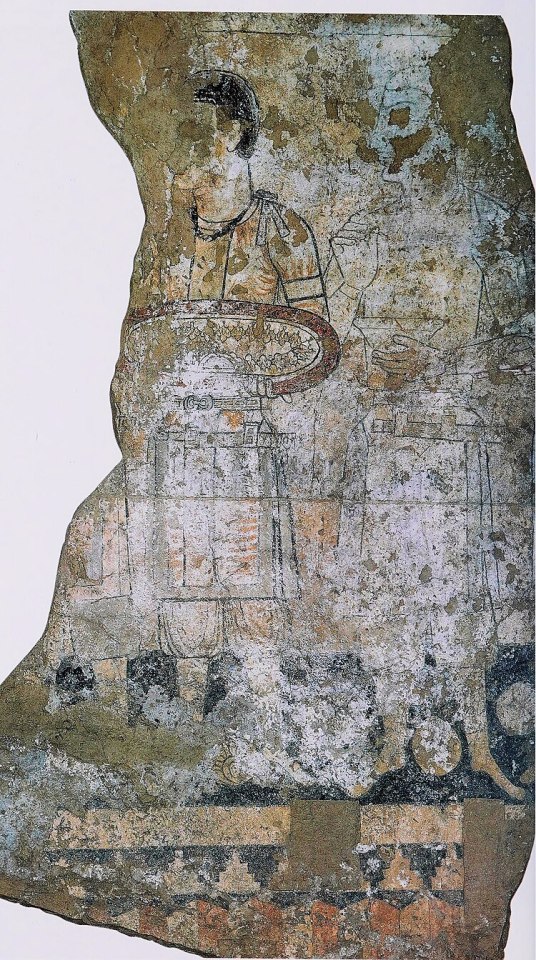
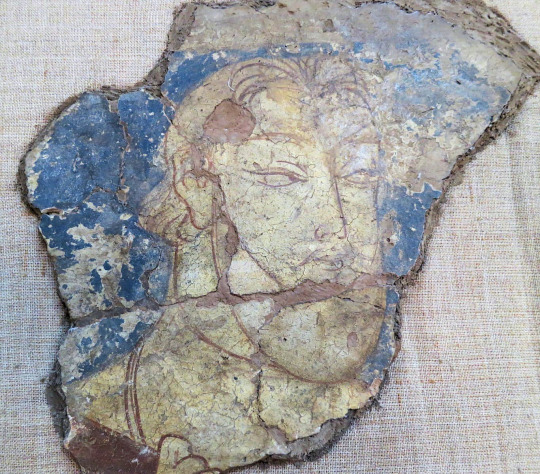
Art from the Sogdian city of Penjakent 5th-8th C. CE. The 3 people in the triple crescent crown may be Hephthalites. A lot more images on my blogspot, link below.
"The Sogdians’ keen interest in depicting the world around them (evidenced by the Hall of the Ambassadors at Afrasiab) and the mythological and supernatural worlds (in many of the Panjikent paintings just discussed) extended into portraying their own world. They did not, as Frantz Grenet points out, represent their mercantile activities, a major source of their wealth, but instead chose to show their enjoyment of it, such as the scenes of banqueting at Panjikent. In these paintings we see how the Sogdians saw themselves.
Chinese representations of Sogdians caricatured them (especially in grooms, musicians, and others of lower status) as having large noses and round eyes, and being heavy-set and generally comical or “barbaric” in appearance. In contrast, the Sogdians’ depictions of themselves show people with fine features—the men (unless rulers or nobles) usually clean-shaven, the women oval-faced and sloe-eyed."
-taken from The Smithsonian
#sogdiana#ancient history#antiquities#history#art#paintings#museums#pagan#paganism#hephthalites#ancient art#medieval art#middle ages#goddess#archaeology
289 notes
·
View notes
Text
Spitamenes
-- Sogdian
-- a warlord
-- led an uprising in Sogdiana and Bactria against Alexander the Great
-- laid siege to the garrison in Maracanda
-- Alexander sent forces, which were destroyed
-- met Alexander's forces again at the Battle of Gabai
-- defeated by Coenus
-- killed by his wife
-- head sent to Alexander
.
Patreon
#studyblr#notes#history#historyblr#world history#world history notes#western civ#western civ notes#western civilization#western civilization notes#ancient greece#alexander the great#greek history#spitamenes#sogdiana#bactria#battle of gabai#coenus#western civ 1#western civ I#western civilization 1#western civilization I
8 notes
·
View notes
Photo

Two Sogdian swords based on art & excavations
17 notes
·
View notes
Text
The Monkey King's Crescent-Style Headband
I finally got around to writing an article on the origin of Sun Wukong's crescent-style golden headband. It has ties to not only Chinese opera but also a triple-crescent crown worn by Iranic Hephthalite and Sogdian rulers.
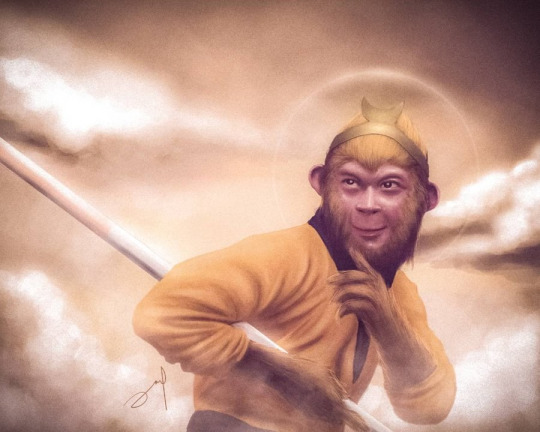
A drawing of Liu Xiao Ling Tong's version of Sun Wukong from the 1986 TV show. Take note of the upturned crescent moon shape in the middle of the headband.
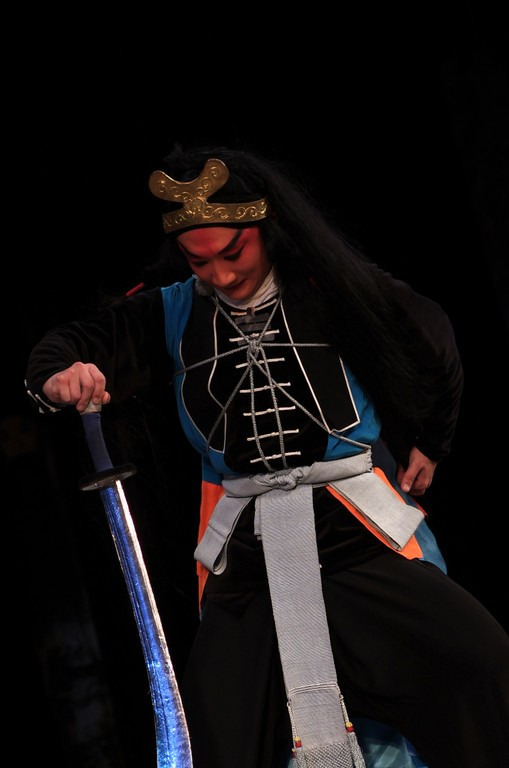
An example of the crescent headband from Chinese opera. The character shown is Wu Song, who shares many similarities with the Monkey King.

Detail from a 6th-century Sino-Sogdian tomb in which the door guardian wears the triple-crescent crown associated with Iranic Hephthalite and Sogdian royalty.
#golden headband#tight fillet#Monkey King#Journey to the West#JTTW#Lego Monkie Kid#Sogdian#Sun Wukong#Sogdiana#China#cultural exchange#Chinese opera
32 notes
·
View notes
Photo

Sogdiane
La Sogdiane (ou Sogdie) est une région d'Asie centrale située entre les puissants fleuves Iaxarte au nord et Oxus au sud. Ses limites orientales et occidentales sont plus difficiles à déterminer, d'autant plus que le toponyme Sogdiane couvrait différentes zones à différentes époques.
Lire la suite...
1 note
·
View note
Text
Serious Female Massage Tantra
Curvy Romi Rain licks and fingers Joanna Angels pussy
Black Kitty Gets Her Pretty Pussy Stuffed By White Dick He Can't Pull Out In Time Not To Cum In Her
Petite Teen Step Daughter With A Great Ass Wants Step Dad Cock Again POV
Pizza delivery guy feeds my wife some cum
Redhead Dawn gets her pussy pounded by a big black cock and takes a huge dripping creampie
Fuck this girl on her way from stream
Sexy Mia Malkova Hardcore
Young cutie brunette teenager amateur Cadey fuck her bald juicy pussy with a glass dildo for intense orgasm
Lady Sonia edging her clit with a vibrator
#spirivalve#cysticercerci#pyjamas#unlighted#preimpose#spikehorn#haik#Puno#proof#armors#ikebana#audibleness#luxurious#pseudoarticulately#olfactometry#Sogdiana#serfism#platband#Rhizinaceae#Seaforth
1 note
·
View note
Text
Alexander the Great Part 4 is out right now and you should read it! This time he totally conquered Persia
1 note
·
View note
Note
What kind of education would Roshanka have had?
I wish we knew.
We can probably assume a few things. It's unlikely she could read. Although, same as he had tutors in Greek appointed for the Persian princesses, I'm sure Alexander did the same for her. He'd consider being able to read and write essential.
We can also assume that, as the daughter of a high-placed warlord, she'd have been raised with all the skills deemed necessary for a well-born Sogdian girl. Unfortunately, we don't know what those were. (See below.)
Last, if she really was as pretty as the texts state (and that's not later romanticism), her father may have had plans to marry her up, perhaps to a local satrap. Or he might even have hoped to place her in the harem of a Persian aristocrat. Because she wasn't Persian, it's highly unlikely a Persian aristocrat would have considered marriage to her, but placement in a harem could offer her, and more importantly her father, a path to greater power.
So that's probably the trajectory in life that she expected. Her rise to first wife of the new King of Asia would have been at once heady and terrifying to her.
Now, as for what were skills deemed necessary for a well-born young Sogdian girl...here we run into problems owing to cultural differences. People might assume, for instance, that weaving would be one...but at least in Persia, weaving was regarded as a low-class skill, something for women in factories, not the highborn. This contrasts with Greek, Macedonian, Roman, and Etruscan expectations that even high-born women learned to weave. So, did Sogdian expectations follow Persian, or did women of all classes weave there?
Almost certainly she wasn't taught to cook, although she would have been taught to supervise a kitchen and keep track of supplies. Basically, she'd have learned how to run a large household.
Apparently, she was taught to dance if, again, Plutarch's account of her presentation to Alexander has any truth to it. But we shouldn't expect "wild" dancing, rather something staid and virginal.
Knowing how to put on makeup, and choose appropriate clothing would also have been important.
She would almost certainly have been taught how to ride, probably quite well. Given the area, and general higher status of women in Persia, she may also have been taught skill with a bow, and how to hunt (perhaps even with trained raptors).
But aside from the dancing, and makeup, riding, and ability to administer a large household, we just don't know what she'd have been taught because we know so little about expectations for women in Sogdiana, or Baktria, and it's dangerous to assume too much from Persian practices.
16 notes
·
View notes
Text
The Lost Queen - IX
— summary: You woke up near a military camp without remembering how and why you got there, you didn’t understand why they were dressed like ancient Greeks, all you knew was that you weren’t safe and you needed to get out of that place as soon as possible. Too bad for you that you found yourself attracting unwanted attention from the Macedonian King and he won’t let you go so easily.
— genre: yandere, dark!au.
— warnings: time travel, obsessive and possessive behavior, murder, mention of torture, kidnapping, angst, fluffy (very rarely), dub-con, possibly smut.
— pairing: yandere!alexander the great x female!reader, yandere!generals x female!reader.
— word count: 1,600.
— tag list: @devils-blackrose, @faerykingdom, @hadesnewpersephone, @mariaelizabeth21-blog1 , @kadu-5607, @zoleea-exultant, @borntoexplore11-blog, @silmawensgarden
— the lost queen series masterlist.


Chapter 9
A few days passed and everything remained the same except for a few changes. The atmosphere in the camp was slowly improving and Alexander seemed to have recovered after your decision.
You still regretted your choice, but you knew it was the right thing to do.
Cleitus finally woke up, to everyone's surprise, and he was recovering slowly, but that was to be expected. It was almost a miracle that he had woken up and that was both a good and a bad thing.
You had prevented his death and changed history.
You sighed and looked around you. There was a lot to be done for the imminent wedding. Alexander wanted to get married fast because they would soon go to Sogdiana Rock and everything had to be done as quickly as possible. Knowing that he would soon meet Roxanna filled you with hope and fear. You hoped he would still marry her, as he was supposed to, but you were worried.
You knew Roxanna's story and you knew what she had done to Alexander's other wives. Honestly, you were more nervous about meeting her than marrying Alexander. And if there were children...
You shook your head, it was better not to think about it for now. There was no guarantee that you would get pregnant with him so quickly and you didn't even want to think about it, the idea of getting pregnant filled you with dread, not because having children was a bad thing, but rather the circumstances and who you would be getting pregnant by. It was all very stressful and you felt like you were going to throw up if you kept thinking about it, so it was better not to think about it, no matter how hard it was.
Nor was there a guarantee that he would marry her because history has already been changed and could change again.
Your head throbbed as you thought of the countless possibilities and chaos that your presence here could have caused in the future. But there was no point in thinking about it now, you would leave soon, you were sure, and you would find out for yourself. You just hoped it wasn't too serious.
''Ugh...'' You grumbled and massaged your temples, trying to ease your headache.
There was still a lot of work to be done. Alexander left you in charge of organizing the wedding, along with some servants and slaves, because according to him, it was something women would do better at. You were tempted to throw your shoe at his head, but you didn't.
Too bad.
Honestly, you never thought your marriage would be like this, that is, if you ever got married. You definitely never thought you would marry Alexander the Great.
And you always imagined that you would have your family and friends present at the occasion, that your mother and friends would help you organize everything, it would be with someone you really loved and it would be a happy occasion.
Instead, you were being forced to marry a man who was supposed to be dead a long time ago, in a place in the middle of nowhere? You weren't sure and it was a very sad atmosphere.
The reality was harsh and painful.
You looked at some colorful fabrics left on your cot and regarded them with apprehension and perhaps disgust. Your wedding dress wasn't what you wanted either, it wasn't white lace or those beautiful dresses you only saw in movies or magazines.
You should get married in black at once, to symbolize your mourning.
You took one that was deep red in your hand and stared at it, taking in its details. It wasn't that bad, but it wasn't what you had in mind. It had some gold features, which you knew was real gold, and a very discreet neckline. Maybe it wouldn't be so bad after all.
Sighing, you prepared to try it out.

Two days passed and everything was ready. It would be a simple but beautiful ceremony, everyone was eager and excited. The atmosphere in the camp changed radically and it was as if everyone had forgotten what had happened to Cleitus and were focused on the wedding and the fact that they would have a Queen and, if the gods permitted, an heir soon.
Alexander was being prepared for the wedding. He had already showered and was putting on the final adjustments, the red tunic he would wear and some jewelry that would complete his appearance. His hair was drying naturally, he wore some kohl on his eye, highlighting his beautiful eyes of different colors, and perfumed. A sweet, soft scent radiated from his clothing.
In general, he was attractive and well dressed. There were no longer any traces of the defeated and drunken man he had been a few days ago, but of a King and a conqueror. And his men were grateful for that.
Hephaestion entered Alexander's tent and smiled to see his friend looking happier and healthier. The image he had of Alexander would still haunt him for the rest of his days.
''You look good, Alexander.'' Hephaestion commented and sat down on a chair and took a jug of water and poured it into a cup, sipping it.
Alexander looked at Hephaestion and his gaze softened and he smiled, ''You look good as well.''
And indeed, Hephaestion was well groomed, as were all the guests. He was dressed in a dark blue tunic with a few ornaments, but enough to make him look more handsome than he already was. His long hair was braided and he also wore kohl, highlighting his blue eyes.
Hephaestion smiled but there was a sadness lurking in his eyes. Alexander noticed and went to his closest friend and placed his hand on his shoulder, trying to comfort him. He knew that today was a painful day for him.
Hephaestion touched Alexander's hand with his own and shook his head, ''I'm fine. I just... I still don't know how to deal with this properly, but I'm fine, I promise.''
''I know it can't be easy, but it's something I have to do. As a King and as a man.'' Alexander whispered the last parts, feeling sorry for his friend. It wasn't easy, neither for him nor for Hephaestion.
''You are the King. You must marry and have an heir, I know that.'' Hephaestion smiled and faced Alexander, ''I always knew that. From our days in Mieza to when you became King of Macedonia. I always knew that.''
''Hephaestion...'' Alexander sighed, suddenly feeling melancholy.
''Do not worry about me. I am fine. The wedding will start soon, don't be late for your own wedding.'' Hephaestion stood up and placed the cup on the table and walked towards the exit, ''I'll be fine.''
Alexander smiled sadly, ''I know you will, after all, you are also Alexander.''
Hephaestion's face lit up and his face looked a little red, but he smiled and waved at his friend and turned away. Alexander watched him with regret, feeling guilty for causing his friend pain, but he couldn't shirk his duties.
And his desires. He wanted to marry you, it was a necessity and he couldn't ignore it.

The sun was setting over the war camp, painting the sky with shades of orange and pink, while the gentle breeze blew through the olive trees and poplars that surrounded the camp.
There was music and dancing involved. Some musicians played instruments, such as the harp and lyre, and dancers danced and enchanted the audience who watched them.
The bride, (Y/N), looked beautiful. Her clothes highlighted her beauty even more, a heavy red and gold tunic draped over her body, with jewelry adorning her and a red veil hid her hair, her face was clean and her natural beauty was highlighted. Her soft, wistful eye was alluring, with the kohl highlighting her color.
The ceremony began with a colorful procession, led by flutists and dancers. (Y/N), draped in a magnificent red robe, gracefully paraded through the camp, crowned with jewels. Her radiant face and eyes sparkled with joy or sadness. Alexander, dressed in a deep red robe, waited anxiously on the table, surrounded by his generals and soldiers watching from a distance.
The priest, a man of great wisdom and a white beard, led the ceremony. With the blessing of the gods, they exchanged vows of eternal fidelity and deep love. As the flame of the eternal candle burned before them, symbolizing the eternity of their commitment, the couple exchanged gold rings, a promise of love that would never lose its luster.
The wedding celebration took place under a starry sky, with long tables filled with Greek delicacies - olives, feta cheese, bread and red wine. Everyone danced to traditional music, celebrating the union of (Y/N) and Alexander. It was a night of joy and communion, where generals, friends and soldiers shared stories, laughter and wishes for eternal happiness.
This was a time of great joy and promise. The promise of an heir and the joy of a marriage that would be talked about for centuries to come.
As the night came to an end, the most awaited hour would arrive. Finally, the consummation would be made and if the gods bless the newlyweds, a child would come from their union.
Only the gods, the children born and the bride would know how cursed this union would be.

— lady l: and that was it! The wedding night is coming and I promise drama in the next chapter, this one was calmer and based on the wedding. I'm not good at describing weddings, but I did my best! I hope you enjoyed it and wait for the next chapter because it, my readers, promises to be CHAOTIC!! 😈 Hope you have liked and feedbacks are always welcome! ❤️
#the lost queen#tlq#alexander the great x reader#yandere alexander the great x reader#yandere alexander the great#yandere history#history#yandere historical characters
250 notes
·
View notes
Text

The Sogdian dish from Kulagysh 7th C. CE.
Dueling Sogdians. This may be a scene from the Shahnameh where Rustam kills Esfandiyar.
288 notes
·
View notes
Note
do you have any resources on mesopotamian iranian syncrestism? also correct me of I'm wrong but a lot of these happened during the achaemenid and parthian periods but not so much during the sassanid period? (if you exclude the selucids as an "iranian" dynasty)
I do not have much, but it's a topic I'm looking into currently, though I will admit I am largely just focused on Tishtrya for the time being (tbf, Thistrya is arguably the most major example of this save for outright incorporation of Mesopotamian deities). Given that the Central Asian evidence goes all the way up to 7th (or in some cases even 10th century) I would say it's fair to say that Sassanian sources can still be useful, also. Even if the kings and clergy became quite dogmatic.
What I have to offer so far:
-Intangible Spirits and Graven Images: The Iconography of Deities in the Pre-Islamic Iranian World by Michael Shenkar, particularly important due to high degree of caution on the author's part. He points out that ex. the often repeated frankly nonsensical Nana = Anahita claim is pure vibes, and the other offered explanations for Anahita's lack of importance in the east are more substantial. He also wrote two articles which are somewhat relevant: Royal regalia and 'Divine Kingship' in the pre-Islamic Central Asia (a bit far-fetched imo), and The Religion and the Pantheon of the Sogdians (5th–8th centuries CE) in Light of their Sociopolitical Structures
-Nana and Tish in Sogdiana and The So-Called “Pelliot Chinois 4518.24” Illustrated Document from Dunhuang and Sino-Sogdian Iconographical Contacts by Matteo Compareti
-My Lord with his Dogs. Continuity and Change in the Cult of Nergal in Parthian Mesopotamia by Lucinda Dirven - more reception than syncretism but I think this still counts, that's really what the Nana(ya) case discussed in the papers above is too after all.
-The Revival of the Anu Cult and the Nocturnal Fire Ceremony at Late Babylonian Uruk by Julia Krul briefly discusses the possibility of Ahura Mazda-Anu syncretism, but I've seen opposition to this proposal elsewhere.
-Other Gods Who Are (there's a copy floating online but it misses around 100 pages for some reason) and The Heartland Pantheon by Wouter Henkelman touch upon mostly Elamite but also some Mesopotamian religious influence on early recorded forms of Persian religious practice. Once again, more reception than syncretism though.
I will try to update this post if I'll find anything else useful.
20 notes
·
View notes
Photo
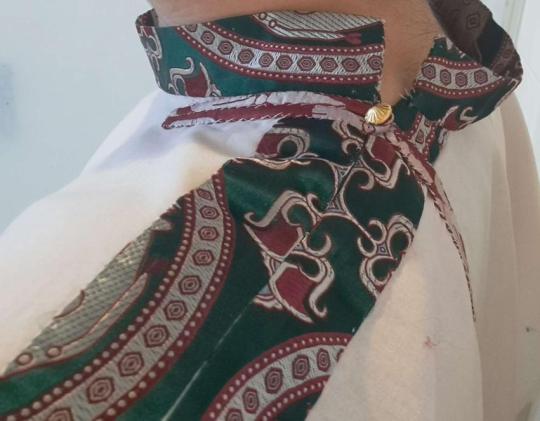


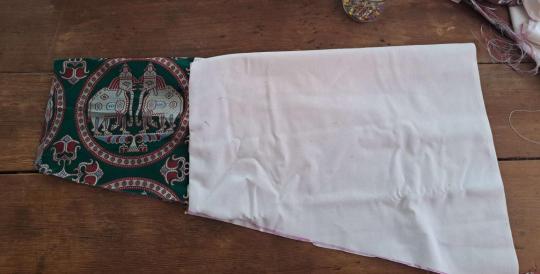
some sewing I’ve got done as of late. working on a new tunic based on panjikent murals using reproductions of early medieval pattern woven silks and plain weave cotton
#I really like how the collar fastening came out#3rd and 4th pictures are of the sleeves#the shoulder strips were pick stitched on; collar was backstitched and then whip stitched inside and at the opening; tabs were whip stitched#sleeve cuff seam was backstitched & then felled with whip stitch#silk from a variety of sources#button from Armour & Castings#my sewing#sogdian#sogdiana#panjikent#afraysiab#afrasiab#iranic#persian#living history
14 notes
·
View notes
Text
Ancient Iranian Peopel: Sogdians

The Sogdians were an ancient Iranian people who inhabited the region of Sogdiana, which is located in present-day Uzbekistan and Tajikistan. They played a significant role in the cultural and economic exchanges along the Silk Road, serving as intermediaries between the East and the West.
Here are some key points about the Sogdian people:
History: The Sogdians were part of the larger Iranian peoples and had a rich history that dates back to at least the 6th century BCE. They established city-states in the fertile valleys of Central Asia, forming a prosperous and cosmopolitan society.
Silk Road Traders: Sogdiana was strategically located along the Silk Road, the ancient trade route that connected China to the Mediterranean. The Sogdians became renowned traders, controlling key points along the route and facilitating the exchange of goods and ideas between the East and the West. They played a vital role in the transmission of Chinese, Indian, Persian, and Hellenistic cultures.
Economic Power: The Sogdians accumulated substantial wealth through their involvement in trade. They specialized in long-distance commerce, transporting goods such as silk, spices, precious stones, and other luxury items across vast distances. Their mastery of commercial networks and languages allowed them to establish thriving trading colonies and to dominate the Silk Road's commerce.
Cultural Influences: The Sogdians were not just traders but also cultural intermediaries. They adopted and transmitted various cultural influences from different regions they encountered, blending elements of Persian, Hellenistic, Indian, and Chinese cultures. Sogdian art, language, and religious practices, including Zoroastrianism and later Buddhism and Manichaeism, were strongly influenced by these interactions.
Sogdian Art and Writing: Sogdian artists were renowned for their exquisite artwork, particularly in metalwork, painting, and ceramics. They created intricate and vibrant motifs that incorporated both local and foreign influences. The Sogdians also developed their own script, known as the Sogdian script, which was an important precursor to the Uighur script used in Central Asia.
Decline: The Sogdian civilization faced significant challenges over time. In the 8th and 9th centuries, Arab Muslim conquests swept through the region, leading to the decline of Sogdiana as a political and economic power. The gradual Islamization of the area further eroded Sogdian culture and traditions.
Today, the Sogdians and their civilization are no longer in existence, but their legacy lives on through archaeological discoveries and ancient texts. The study of Sogdiana and its people provides valuable insights into the complexities of cultural exchange and the historical significance of the Silk Road.
Read More About Sogdians:
Ancient Iranian Language: Sogdian
Follow my YouTube channel. Silent tablets documentary, short videos from ancient history.
Follow my Twitter.
#ancient mesopotamia#mesopotamia#archaeology#ancient history#iranian#ancient iran#iranian languages#iran#iranian peopel#sogdian language#sogdian#tajikistan#uzbekistan
3 notes
·
View notes
Text
MEMORIAS DE UN GUERRERO PERIPATÉTICO
Imagina a un joven combatiente, que sale a recuperar territorios que pertenecían al reinado de su padre, Filipo, cobijado por grandes guerreros que además fueron sus maestros.
Imagina ahora a un príncipe estudiante, de la mano del mismo Aristóteles, que le enseña a reflexionar e imaginar un mundo mejor.
Imagina ahora que ese joven guerrero no para de conquistar y va sembrando ciudades por doquier e imaginando cómo lograr que la gente viva mejor. Todo un peripatético, en honor a su ilustre maestro.
Si lo lograste imaginar, ya tienes en tu mente al gran Alejandro de Macedonia. Por ello, a continuación, te presento el resumen de una magistral obra de Mary Renault, enfermera, que vio por primera vez la luz en Londres en 1905 y fallecida en Ciudad del Cabo, a los 78 años.
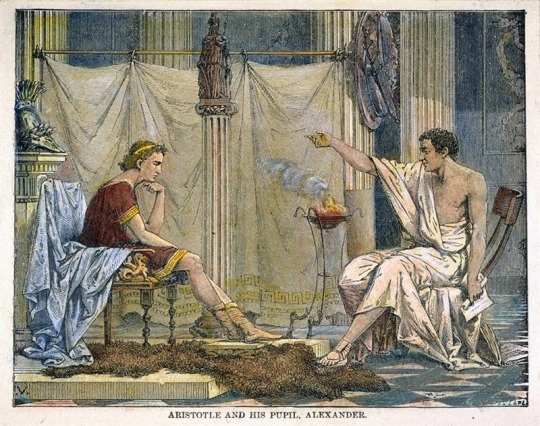
EL MUCHACHO PERSA
Mary Renault
Editorial Grijalbo, 1972
Penguin Random House
426 páginas
28 capítulos.
Argumento
Vida de Alejandro Magno
Narrador:
Bagoas, un joven persa, aristócrata, capturado a los 5 años, castrado y vendido como esclavo a Datis, quien lo sodomizó desde los 12 años. Luego vendido a Dario III, rey de Persia.
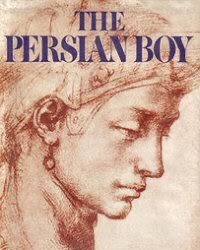
Personajes, por orden de aparición:
Bagoas
Oromedón, instructor
Dario III
Artabazos
Doriskos
Bessos, el traidor
Nabazanes, el padrino
Alejandro
Hefaiston, su amigo de la infancia, también guerrero, general.
Bucéfalo
Perias (el perro)
Olimpia, la reina madre
Kleitos, uno de los dos generales de más confianza.
Filostrato, Filósofo y maestro de la corte
Kalistenes, cronista enviado de Aristóteles
Roxana, la esposa sogdiana
Los filósofos desnudos de Nyza, India.
El rey Poros derrotado, pero recompensado.
Kalanos, el pensador gurú indio que lo siguió hasta Babilonia.
Barsine-Estatira, hija del rey Darío III, segunda esposa.
Parysatis, hija del rey Artajerjes III.
Sitios de la narración:
- Susa
- Babilonia
- Persepolis
- Ecbatana
- Zadrakarta
Frases destacadas:
1. Fui educado en el honor, a montar, a utilizar las armas y a aborrecer las mentiras.
2. En casa me habían enseñado que, después de la cobardía y la mentira, la peor desgracia que podía acontecerle a un hombre era el comercio de si mismo.
3. El conocimiento puede alterar la memoria.
4. Lo cierto es que, a pesar de que el hombre sabio es consciente de que toda belleza nace para morir, a uno no le gusta que se le recuerden tales cosas.
5. Cuando mi sepulcro se abriera, me enfrentaría con un destino desconocido, como el niño encerrado en las entrañas de su madre.
6. En los llanos suele ser mejor el vino. Cuando el agua es mala el vino es bueno.
7. El polluelo vivo en el interior del cascarón no conoce ningún otro mundo. A través de las paredes del mismo observa una blancura pero no sabe que se trata de la luz. Y, sin embargo, golpea la blanca pared sin saber por qué. Un rayo le alcanza el corazón y el cascarón se abre. (Capítulo 11).

8. Tu vino es demasiado fuerte para beberlo con frecuencia, querido mío.
9. Un rey —decía el libro de Jenofonte en alguna parte— no sólo debe demostrar ser mejor que aquellos a quienes gobierna sino que debe arrojar sobre éstos una especie de hechizo.
10. No hay nada comparable a hacer feliz al que se ama.
11. Hay que vivir como si fuera para siempre y como si se pudiera morir en cualquier momento. Siempre las dos cosas a la vez.
12. En Macedonia cualquier hombre libre puede hablar cara a cara con su superior; cualquier superior u hombre libre puede hablar con el rey.
13. El fin y el objeto de la conquista, es evitar hacer lo mismo que los vencidos. Cuando conquistamos una región debemos demostrar ser mejores legisladores que aquellos a los que hemos vencido.
14. Al convivir con filósofos de la India, uno de ellos le responde: “A los hombres los has cambiado ciertamente. Por ti han conocido el miedo y la cólera, el orgullo y el deseo, las cadenas que apresarán sus almas a lo largo de muchas vidas. Y a ti, que te crees libre porque has dominado el temor y las codicias corporales, los deseos del espíritu te consumen como un fuego abrasador y pronto arderás en ellos.”
15. Otro de ellos le dijo” «Hasta los dioses se cansan de su divinidad y buscan alivio al final. Iré contigo hasta que seas liberado».
16. Ahora sólo vivía para avanzar hacia el Ganges, seguir su curso y alcanzar el Océano Circundante. Su imperio sería una obra acabada de mar a mar, coronada por una maravilla.
17. Alejandro siempre decía que todas las cosas buenas había que pagarlas.
Críticas al libro:
Triste y a la vez noble historia de un joven mancebo persa, de familia aristocrática, poblada de hechos históricos de la antigua Persia, la tierra del mismísimo Ciro y fecunda relación de las hazañas y del carácter de Alejandro.
Destaca en este bello libro la descripción del antiguo palacio imperial de Babilonia, con su alberca bañada de agua del mismo Éufrates, calentada por filtros de sol, de paredes de oro e incrustaciones de lapizlazuli, rodeado de finas plantas y sofás con cojines de lino.
Me gusto el episodio donde el muchacho persa se defiende de un depredador y con su agilidad utiliza su daga para deshacerse de él aunque no puede parar de acuchillarlo en el corazón repetidas veces hasta que escucha una voz que le dice que ya se detenga.
Sorprende como un hijo de la antigua Macedonia, sucesor de Filipo II, alumno de Aristóteles, destaque tanto en su espíritu guerrero, logrando expandir el pequeño reino de su padre al enorme territorio persa y hacia la parte norte de India, la extensión más grande jamás pensada, permitiendo difundir la cultura Helénica por los siguientes 300 años.
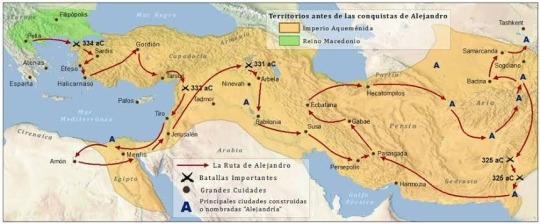
En la novela, Bagoas tiene 15 años cuando inicia su relación con Alejandro, que tenía unos 26. Renault describe la relación hasta su final, la muerte de Alejandro, cuando Bagoas tiene unos 22 años y Alejandro 33.
Sin duda es grato encontrar en el libro un buen espacio para Bucéfalo (su fiel corcel) y para Peritas (su fiel berro) lo cual transmite la nobleza de corazón de este controvertido hombre.
Otro pasaje hermoso, sin duda, es cuando Alejandro en una noche de pasión, presenta a Bagoas nada menos que el poema de la Iliada de Homero, lo cual es sin duda ninguna un gesto de alta sensibilidad de la escritora. Dicen que decía Alejandro, “Oh, qué afortunado el joven Aquiles, que encontró en Homero el heraldo de su gloria.”
Parece ser que Mary Renault elige también ser juglar de las hazañas de Alejandro y ayudar a cumplí su sueño de ser recordado para siempre.
La muerte de Clito el maestro de las artes militares del propio Alejandro, atravesado por la furia de una lanza, impregnada del rencor por haber sido recriminado por su creciente autocomparación con los dioses y su extremada orientalización y además impregnado del efecto del maldito alcohol en exceso, marca sin duda el inicio de su caída, en aquel fastuoso banquete de Samarcanda.
El regreso de la India a Persia, después del amotinamiento de sus tropas y la muerte de su amado Hefestion, trajo numerosas desilusiones (traiciones, robos, abusos) de sus supuestos hombres nobles agradecidos y nobles gobernantes, que seguramente hicieron sangrar su generoso espíritu. Percatarse de la fragilidad y la podredumbre humana nunca ha sido agradable.
Otro pasaje interesante es la presencia constante de la madre (la reina Olimpia) que desde su lejanía en Epiro Macedonia, parece actuar como la consciencia de Alejandro, llamándole la atención, guiándolo o recriminándole algo, a pesar de ser el Rey. Tal vez por eso Alejandro nunca volvió a su lado.
Conviene honrar la memoria y recordar que Aristóteles nació en el año 384 a.C., quien a diferencia de Sócrates o Platón, no era ateniense, sino que era de una región del norte, era un macedonio. El futuro filósofo nació en un pueblo llamado Estagira y su padre era el médico de la corte de Filipo II, Rey de Macedonia. Si bien que fue formado en Atenas desde los 17 años, en la Academia del mismo Platón, después de 20 años de formación regresa a Macedonia donde realiza numerosos estudios de Biología y se encarga oficialmente de ser el tutor por 5 años del joven heredero al reino de Macedonia: Alejandro Magno. En el año 335 a.C. volvió a Atenas para fundar su propia escuela, el Liceo, que se conviritió en competencia directa de la Academia de Platón. La escuela se conocerá como peripatética y a sus estudiantes se les llamará peripatéticos.
Grata paradoja da la vida, porque el mismo Alejandro fue un peripatético que meditaba entre batalla y batalla y sobre todo tras las batallas. La mayor enseñanza de Aristóteles era que el conocimiento se aprende a través de la experiencia, una materia que bien aprendió el joven conquistador. Tal vez sus numerosas Alejandrías eran un tributo a su antiguo maestro de quien nunca se olvidó, ya que después de cada batalla enviaba colecciones de flora y fauna para que continuara sus estudios.
En los días antes de morir tenía fiebre persistente, respiración acelerada y áspera, dolor del mismo costado de la herida de la flecha Malí, luego tos, sangre y debilidad. Un cuadro que parece una triste Neumonía, como recordándole la vida que los no dioses mueren como lo hacen los hombres, como simples mortales.
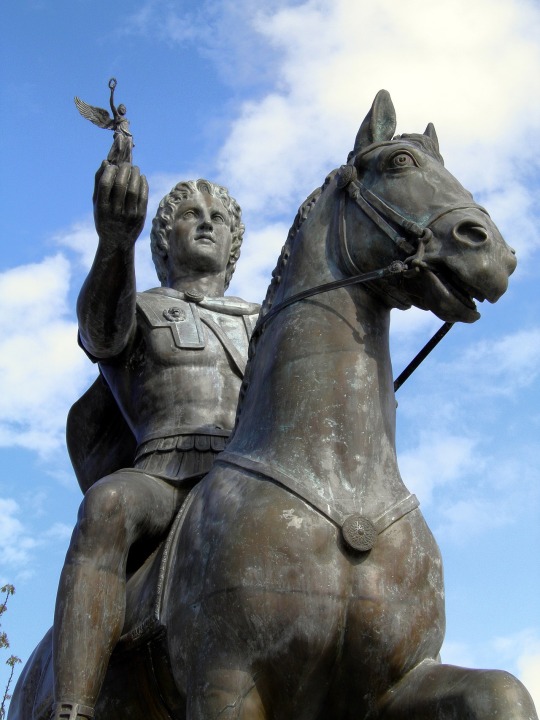
Y al día siguiente de su último suspiro, llegaron los encargados, lo trataron como a un rey, lo embalsamaron como a un gran soberano, un semidiós. Era el 13 de junio del 323 A.C., a sus 33 años, y lo cubrieron de mirra.
Resumido para ti por: El Búho Literato
0 notes
Text

Anônimo (século XIV) - Suposto retrato de Genghis Khan
Genghis Khan nasceu entre 1155 e 1162 no que corresponde à atual província de Khentii na Mongólia, e morreu em agosto de 1227 no atual condado de Qingshui (China), é o fundador do Império Mongol, o maior império contínuo de todos os tempos, estimado em sua extensão máxima em aproximadamente 36,5 milhões de km2 em 1268 sob Kublai Khan.
Vindo da casa principesca dos Bordjiguines, ele reúne vários povos-estados nômades (ulus) da Ásia Oriental e da Ásia Central sob a identidade comum de “mongóis”; ele se tornou o kha (rei), depois o Tchingis Khagan (imperador), antes mesmo de partir para conquistar a China. No final do seu reinado, controlava grande parte da Ásia, incluindo, além da Mongólia, o norte da China e Sogdiana.
Após a sua morte, o império foi consideravelmente expandido pelos seus sucessores que continuaram a governá-lo por mais de 150 anos. Seu neto, Kublai Khan, foi o primeiro imperador da dinastia Yuan na China.
Para os mongóis, que o consideram o pai da sua nação, Genghis Khan é uma figura lendária rodeada de grande respeito.
0 notes
